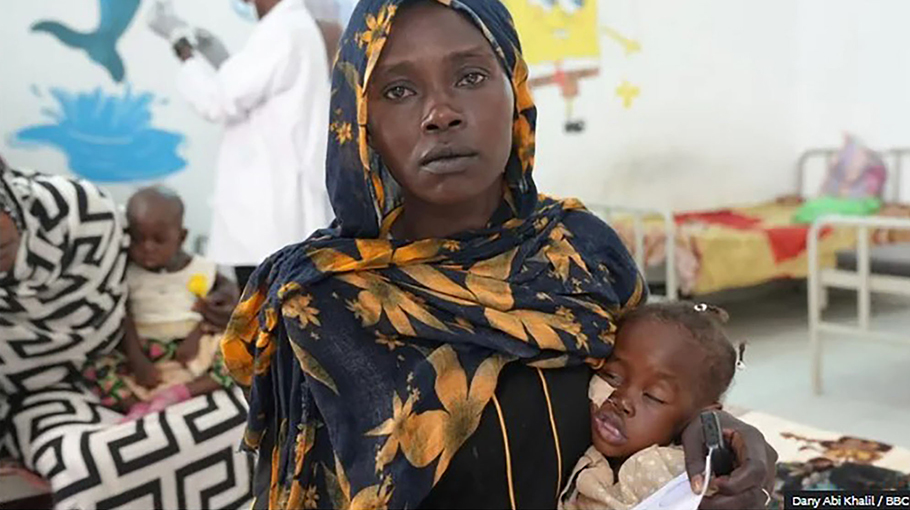Famine looms in Sudan as civil war survivors tell of killings, rapes

Civilians caught up in Sudan's civil war have given graphic accounts to the BBC of rape, ethnic violence and street executions. Our journalists have managed to make it to the front line of the fighting close to the capital, Khartoum.
Top UN officials have said the conflict has plunged the country into "one of the worst humanitarian nightmares in recent history" and could trigger the world's largest hunger crisis.
There are also fears that in Darfur, in the west of the country, a repeat of what the US called genocide 20 years ago may be beginning to unfold.
As if out of nowhere, a huge blast shakes the road in Omdurman. People scream and run in all directions, shouting: "Go back, go back, there'll be another one." Thick smoke blankets everything.
Moments earlier, the battered street had been dotted with pedestrians picking up rice, bread and vegetables from the shops, which had only recently begun to re-open.
In mid-February, the Sudanese army retook the city - one of three along the River Nile that form Sudan's wider capital, Khartoum. Civilians have now started to return, but mortars, like the one that landed in the middle of this main street, still fall daily. For international media, gaining access to cover the civil war that erupted last April has been difficult - but the BBC has managed to get to the front line.
The vicious power struggle between the country's military and its former ally, the Rapid Support Forces (RSF) paramilitary group, has killed at least 14,000 people across the country - possibly many more.
For nearly a year, the army and the RSF have battled over Khartoum and the nearby cities.
The RSF has taken control of areas south of the capital, as well as large swathes of Darfur, which has been in turmoil for years with violence between its various African and Arab communities.
Women who escaped Darfur to neighbouring Chad have given the BBC accounts of being raped - sometimes multiple times - by militiamen. Men in the camps told us they had escaped street executions and abductions.
Embedded on the front line with the army in Omdurman, the BBC team's movements were carefully controlled - we had a minder with us and were not allowed to film military activity.
The army fears information about its activities will be leaked.
They turn out to be from military intelligence, but it's a sign of how high tensions are.
Despite the army's recent gain in Omdurman, we can still hear exchanges of fire crackling around the area from time to time.
Part of the front line now runs along the Nile, which separates Khartoum on the eastern side from Omdurman, which is west of the river.
The military tell us RSF snipers are stationed in apartment blocks across the water from Sudanese army positions at the badly damaged parliament building.
Omdurman's old market, once busy with locals and visitors, is in ruins, its shops looted bare. Most vehicles on the roads are military.
More than three million people have fled Khartoum State in the past 11 months, but some Omdurman residents have refused to leave. Most we meet are elderly.
Less than a kilometre from the front line, Mukhtar al-Badri Mohieddin is walking with a stick near a mosque with a damaged minaret.
The open space opposite is covered with makeshift graves - rough earth mounds marked with broken bricks, boards and concrete slabs.
"There are 150 people here. I knew many of them, Mohamed, Abdullah… Jalal," he says, pausing for a long moment before one name, Dr Youssef al-Habr, a well-known professor of Arabic literature.
"It's just me left," he adds.
The Sudanese military has been criticised for its heavy use of aerial bombing, including in civilian areas where RSF fighters hide out - though it says it takes "necessary precautions" to protect civilians.
People here hold both sides responsible for the destruction in and around the capital.
But many accuse the RSF of looting and attacks during the time it controlled the area.
"They cleared the houses of belongings, they stole cars, TVs, they beat up old people, even women," resident Muhammad Abdel Muttalib tells us.
"People died of hunger, I pulled some of them out of their houses so the bodies wouldn't rot inside," he adds.
He says it is "widely known" that women were raped in their homes and groped during security checks.
Afaf Muhammad Salem, in her late fifties, was living with her brothers in Khartoum when the war broke out.
She says she moved across the river to Omdurman after they were attacked by RSF fighters, who she says looted their house and shot her brother in the leg.
"They were beating up women and old men and threatening innocent girls," she says.
It is a veiled reference to sexual violence, which is a taboo topic in Sudan.
"Insulting honour does more harm than taking money," she adds.





